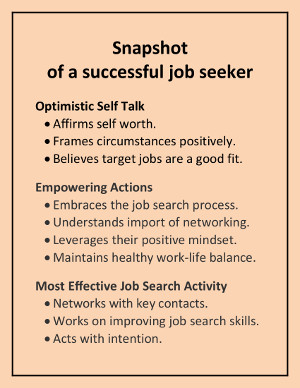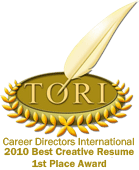 The Career Thought Leaders Consortium, the industry’s leading think tank for the now, the new, and the next in careers, conducted a nationwide online survey of job seeker behavior to uncover success factors. While many surveys identify the most effective job search methods, this research is groundbreaking in that it uncovers what causes job seekers to be optimistic and effective in the job search or, conversely, discouraged and ineffective.
The Career Thought Leaders Consortium, the industry’s leading think tank for the now, the new, and the next in careers, conducted a nationwide online survey of job seeker behavior to uncover success factors. While many surveys identify the most effective job search methods, this research is groundbreaking in that it uncovers what causes job seekers to be optimistic and effective in the job search or, conversely, discouraged and ineffective.
Job seekers were asked five open-ended questions:
- Optimistic Self-Talk: Think of a specific time (either recently or in the past) when you were in job search mode and you felt encouraged and hopeful about landing a new job. With this specific time in mind, recall what words you said to yourself that made you feel optimistic (these words or thoughts represent your “internal dialogue” or “self-talk”).
- Empowering Actions: As you recall this particular incident and the specific words you said to yourself to feel optimistic, what specific action (if any) did you then take that helped keep you motivated.
- Disempowering Self-Talk: Think of a specific time (either recently or in the past) when you were in job search mode and you felt stuck or discouraged about landing a new job. With this specific time in mind, recall what words you said to yourself that made you lose your feeling of optimism?
- Disempowering Actions: As you recall this particular incident and the specific words you said to yourself that caused you to lose your feeling of optimism, what specific action (if any) did you then take that caused a loss of motivation?
- Most Effective Job Search Activity: In general, what ONE specific activity do you engage in that gives you the best results in your job search?
Responses
The job seekers’ open-ended responses to the 5 research questions were then reviewed by careers professionals (career coaches/counselors, job search strategists, resume writers). The careers professionals proposed 3-5 category labels that best described the various responses. Those categories are reported below as percentages. Although there are 3-5 different categories for each question, it should be noted that a response with a smaller percentage was just as effective (or ineffective) as a response with a larger percentage, since different ways of thinking and taking action will be appropriate for different people.
Optimistic Self-Talk: 47% of job seekers’ responses indicated that affirming their self-worth helped them remain optimistic; 30% noted that framing external circumstances (becoming unemployed, not getting an offer after an interview, and so on) in a positive light helped them remain optimistic; and 23% noted that focusing on the belief that their target jobs were a good fit for their skills was key to remaining optimistic.
Empowering Actions: 48% of job seekers’ responses indicated that embracing the job search process was their most empowering action; 20% indicated that understanding the importance of professional and social networking was their most empowering action; 18% leveraged their positive mindset (read inspirational/motivational books, posted encouraging notes to themselves, and so on); while 14% of job seekers’ responses indicated that maintaining a healthy work-life balance was their most empowering action.
Disempowering Self-Talk: 26% of job seekers’ responses indicated that their most disempowering selftalk centered on doubting their abilities; 23% of responses indicated that engaging in fatalistic “worst-case scenario” thinking was the most disempowering self-talk; 23% focused on the negatives or things lacking in their lives; 14% focused on the frustration of the job search process, particularly the online application process; and 14% noted concerns about age discrimination as their most disempowering self-talk.
Disempowering Actions: 42% of job seekers’ responses indicated that their most disempowering action involved withdrawing from or slowing/stopping their search; 26% of job seekers’ responses indicated that focusing on negatives such as rejection letters or poor interview performances was their most disempowering action; 20% engaged in self-sabotage such as not preparing for interviews or applying for positions that weren’t a good fit; while 12% of job seekers’ responses indicated that their most disempowering action involved procrastinating with unproductive activities such as overeating and watching television.
Most Effective Job Search Activity: 67% of job seekers’ responses indicated that their most effective job search activity involved networking and communicating with key contacts; 20% indicated their most effective job search activity involved working on improving their job search skills (e.g., working with a job search coach on how to communicate worth/value to potential employers, improving resume and cover letterwriting skills, creating PowerPoint presentations for interviews, learning how to use online job-search agents, and so on); and 13% indicated that their most effective job search activity involved acting with intention, such as taking personal responsibility, treating job search as a 40-hour/week job, following a schedule, praying, and persevering.
Source: Career Thought Leaders’ Job Seeker Success Survey, 2013
If the chances of your being able to keep up with all of these activities seem remote, contact me to find out how a certified career coach can help with accountability and encouragement.








